



Foundations

Foundations
“When the foundations are being destroyed, what can the righteous do?”
Psalm 11:3 NIV
Atheists like to think of themselves as moral, and the concept of accountability to God as both unnecessary and oppressive. But God defines morality, not man. He is our creator, benefactor, and obedience is our life. His expectations form the boundaries for a safe playground, not a prison. God identifies Himself with words like “kind, just, righteous” (Jeremiah 9:23-24, Isaiah 51:4-5, John 16:8) and people described Him that way (Psalm 9:7-8, 11:7, 21:3, 33:4-5, 50:6, 99:4, Isaiah 5:16, 11:4-5, 26:9, 33:5, Daniel 4:37.) Most humans self-identify with these adjectives, too, so how does God define them? What do kindness, justice, and rightousness look like in the Judeo-Christian Biblical worldview?

| Kindness | Justice | Righteousness | Capital Offenses | Faithfulness (Loyalty) | Fear | Freedom |
|---|---|---|---|---|---|---|
|
EX 22:21-22 EX 23:5 EX 23:12 LEV 19:9-10 LEV 23:22 DT 22:1 DT 22:4 DT 23:19 DT 24:19-21 DT 25:4 EZR 9:13 PR 12:25 PR 19:17 JER 9:23-24 HOS 6:6 ZEC 7:10 MIC 6:8 MT 5:38-48 MT 7:12 MT 25:37-40 LK 6:27-36 ACT 20:35 ACT 28:2 ROM 12:10 1CO 13:4-7 GAL 5:13 GAL 5:22-23 GAL 6:9-10 EPH 4:29 EPH 4:32 PHP 2:3-4 COL 3:12-13 HEB 4:16 HEB 13:16 1TH 5:11 1PE 3:8-9 1JN 3:18 |
EX 20:12-17 EX 22:1-15 EX 23:1-3 EX 23:6-9 LEV 5:1 LEV 5:17 LEV 6:2-5 LEV 19:11-18 LEV 19:32-36 LEV 25:14 LEV 25:17 LEV 25:43 DT 1:17 DT 16:19-20 DT 19:14-21 DT 23:15-16 DT 23:24 DT 24:14-17 DT 25:1 DT 25:13-14 DT 32:35 PR 3:27-30 PR 11:1 PR 16:8 PR 17:15 PR 17:23 PR 17:26 PR 18:5 PR 18:17 PR 19:5 PR 19:28 PR 20:10 PR 20:23 PR 21:15 PR 24:24-25 PR 29:27 ISA 1:16-17 ISA 5:15-24 JER 21:12 JER 22:3 AM 5:15 MIC 6:8 HAB 2:9-12 ZEC 7:8-10 MAL 2:17 ROM 12:19 ROM 13:1-10 1CO 6:1-12 HEB 10:30 |
GE 15:6 EX 15:26+ DT 6:25 DT 9:4-6 DT 12:8 DT 24:10-13 2SA 23:3-4 PR 14:34 PR 16:8 PR 25:5 PR 28:5 PR 29:7 ISA 33:14-15 ISA 45:18-19 HAB 2:4 MT 6:1 MT 6:33 MT 13:49 MT 21:32 ROM 2:13 ROM 3:20-22 ROM 4 ROM 6:16-23 ROM 7:7 ROM 9:30-31 ROM 10:2-10 2CO 6:14 2CO 11:14-15 GAL 2:21 GAL 3:11 PHP 1:9-11 PHP 3:8-9 2TI 3:16-17 JAM 2:20-26 JAM 3:18 |
GE 9:5-6 EX 21:12-17 EX 21:22-23 EX 21:29 EX 22:18-20 EX 22:22-24 EX 31:14-15 EX 35:2 LEV 20:1-5 LEV 20:9-16 LEV 20:27 LEV 24:16-17 LEV 24:21 LEV 27:29 NUM 25:5 NUM 35:16-18 NUM 35:21 NUM 35:31 DT 13:1-18 DT 17:2-7 DT 17:12 DT 18:20 DT 19:11-13 DT 21:18-21 DT 22:21-25 DT 24:7 MT 5:20-22 MT 5:27-30 MT 5:31-32 MT 12:31-32 LK 12:9-10 REV 21:8 REV 22:15 |
EX 20:3-11 EX 20:23 EX 22:28 EX 23:19 EX 23:24 EX 23:33 EX 34:14 EX 34:17 LEV 19:4 LEV 19:26 LEV 19:31 LEV 22:20-22 LEV 22:32 LEV 26:1 DT 4:19 DT 6:14 DT 7:3 DT 7:26 DT 8:11 DT 17:1 DT 23:6 1SA 15:22-23 1KI 18:21 2CH 15:2 2CH 16:9 PR 3:5-6 EZE 11:12 ACT 5:29 |
GE 22:12 EX 1:21 EX 14:31 EX 20:20 DT 5:29 DT 6:1-2 DT 6:13 DT 6:24 DT 10:12 DT 10:20 DT 31:12-13 JOS 4:24 JOS 24:14 1SA 12:24 PS 111:10 PS 112:1 PR 1:7 PR 3:7 PR 9:10 PR 16:6 PR 31:30 ECC 12:13 ISA 8:12-13 ISA 41:13 JER 32:40 LK 12:5 1PE 2:17 1JN 4:18 |
GE 2:16 LEV 25:10 DT 24:5 DT 30:19 PS 119:32 PS 119:45 PS 129:4 PS 142:7 PS 146:7 PR 11:21 ISA 61:1-3 LK 4:18-19 JN 8:31-32 JN 8:34 JN 10:10 1CO 10:23-33 2CO 3:17 GAL 4:7 GAL 5:1 GAL 5:13 JAM 1:25 JAM 2:12 1PE 2:16 2PE 2:19 |
The graphic above only partially illustrates the devine boundaries, and the concept is oversimplified on this webpage for the sake of brevity. Christians are to be like God (Matthew 5:48, 2 Corinthians 5:20) so demonstrating His kindness, justice, and righteousness are important. We get a more complete understanding of justice, and the utlimate Judge, when we recognize what He dislikes so strongly, He declared a capital offense. Freedom is not necessarily earned but it is conditional, and faithfulness and reverent fear are two more necessary conditions. Recognizing these foundational concepts is important because inside the boundaries are amazing freedom, safety, stability, and truth. Outside the boundaries are deception, chaos, suffering, bondage, and worse (John 10:10, 8:44, 2 Corinthians 11:14-15, 1 Peter 5:8). God's expectations for us are largely character based, giving us a huge range of freedom of how we demonstrate (what we do with) good behavior. His expectations are like the guardrails that keep our car safe on an otherwise dangerous road.

To maximize the chance we're speaking the same language, here are some of man's definitions from Merriam-Webster's Dictionary:
- Justice: (noun)
- the maintenance or administration of what is just especially by the impartial adjustment of conflicting claims or the assignment of merited rewards or punishments
- the quality of being just, impartial, or fair
- Just: (adjective)
- acting or being in conformity with what is morally upright or good : righteous
- being what is merited : deserved
- legally correct : lawful
- Righteous: (adjective) acting in accord with divine or moral law : free from guilt or sin
All sports have rules, and players are eager to learn those rules. Few people buck the rules in sports, but most people buck the rules God gave (Matthew 7:13-14). Everyone recognizes the rules in sports are to enable good sportsmanship, including especially how the game should be played, and played safely (preserving everyone's safety, not just the winner's). The key is sports rules are man-made, so we accept them better, because we have the remotest chance of changing them should we decide they need revised. God's rules are immutable, so most of us resent them until (if ever) we realize they really are in our best interest. The inventor of the sport made its rules, and the inventor of the universe made its, both in the realm of science and in culture. Some of the most recognizable rules in sports are those that create the boundaries of the playing field:



If we all took God at His word and accepted His definition of kindness, justice, and righteousness, what kind of world would we live in? Dennis Prager answers that question in his 11 part video series on the 10 Commandments, here (each part is only 5 minutes).
Atheists reject the 10 Commandments as oppressive, along with all religion, especially Christianity. They think they can be just as moral as Christians (as theists) without accountability to any deity/creator. Charles Darwin, credited for catipulting evolution to a dominating trend catalized by his book, On the Origin of Species, said in 1844, "I always feel as if my books came half out of Lyell's brains and that I never acknowledge this sufficiently." Charles Lyell saw himself as "the spiritual saviour of geology, freeing the science from the old dispensation of Moses." In other words, it was his goal to pry science away from God (in the minds of men). Karl Marx, also in 1844, infamously declared "religion is... the opium of the people," and later "my object in life is to dethrone God and destroy capitalism." Communism was Marx's invention to achieve this end, stating "Communism begins where atheism begins." He admitted "we have no compassion and we ask no compassion from you. When our turn comes, we shall not make excuses for the terror." Communism accomplished a lot in the 20th century. As just a couple highlights, Chinese Mao Zedong murdered (on a low estimate) 50 million of his people. Russian Josef Stalin murdered 15 million of his. Cambodian Pol Pot murdered almost 2 million. All three of these were communists. North Korean Kim Sung murdered over 1.5 million, though he was more a general socialist than specifically a communist, and definitely an atheist. Of course there was German Adolf Hitler and his over 10 million, but he didn't identify with atheism nor communism. And these are just the number of murders, add the deaths by war and violence and the number skyrockets, in just one century. The Spanish inquisition killed a few thousand people, and the Crudaides resulted in 2 million deaths spanning two centuries, and both were perfect lessons in missing the point. It doesn't make sense to believe we can reject God, or self define Him, and still be moral. We learned what good and evil were early on (consider Genesis 3:22) and in King David's day it was spelled out that no one is good in Psalm 14:3. Jesus confirmed it in Mark 10:18 / Luke 18:19, and Paul repeated in Romans 3:12. Praise God for John 3:16! The trick is, when we (atheist, Christian, or otherwise) reject or distort God's expectations of right and wrong, bad things happen.
An important detail is God defined morality should be taught with God’s definition first, and leave man-made-up clarifications and supplements both for later and as secondary. In other words, the moral teachings of the church (much less the government or anyone else) even the capital ‘C’ Church, may be relevant but not compared to the original Word of God as recorded in the Bible. Jesus commented twice on this: Matthew 15:3, 15:9/Mark 7:7. Certainly the teachings of Jesus are critical, but part of the point of this article is to highlight that God’s expectations were laid out for us long before He chose to come down here and set us straight. When He did visit, He helped us understand the original intent of His expectations. He didn’t cancel nor correct (update) His moral expectations for us (Matthew 5:17-18, Romans 3:31) and He de-emphasized the ceremonial regulations (Mark 2:27, Acts 10:15). This is not about being legalistic, it’s about knowing, caring about, and chosing to obey the expectations of our Creator.
By the way, there are very specific names for different levels of expectations.
- When God declares right and wrong, it’s called morals.
- When industries or other groups of volunteers agree on a set of right and wrong, it’s called ethics.
- When rulers or legislatures do it, it’s called law.
- When people in authority do it, it’s called political correctness.
- When most of society agrees, it’s called popular opinion, or culture.
There are many foundations. Other major themes of Biblical worldview include the importance of love (unconditional and brotherly, more than romantic) and our relationship with our Creator, God. This relationship is the most important of any in our life since it exclusively determines what happens to us when we die. When we read God's word it is clear that God wants a relationship with each of us more than He ever wanted a world religion. Study God’s word for the rest of your life, it is more important than prayer (Proverbs 28:9, Zechariah 7:13, as important as prayer is), for it is your life (Deuteronomy 32:46-47, John 14:6, 20:31, Acts 17:24-25).
“The Lord says: ‘Let not the wise take pride in their wisdom or the strong in their strength or the rich in their riches, but only take pride in this: that you have the understanding to know Me, that I am the Lord, who exercises kindness, justice, and righteousness on earth, for in these I delight,’ declares the Lord.”
Jeremiah 9:23-24
Bonus: evolution of the graphic:
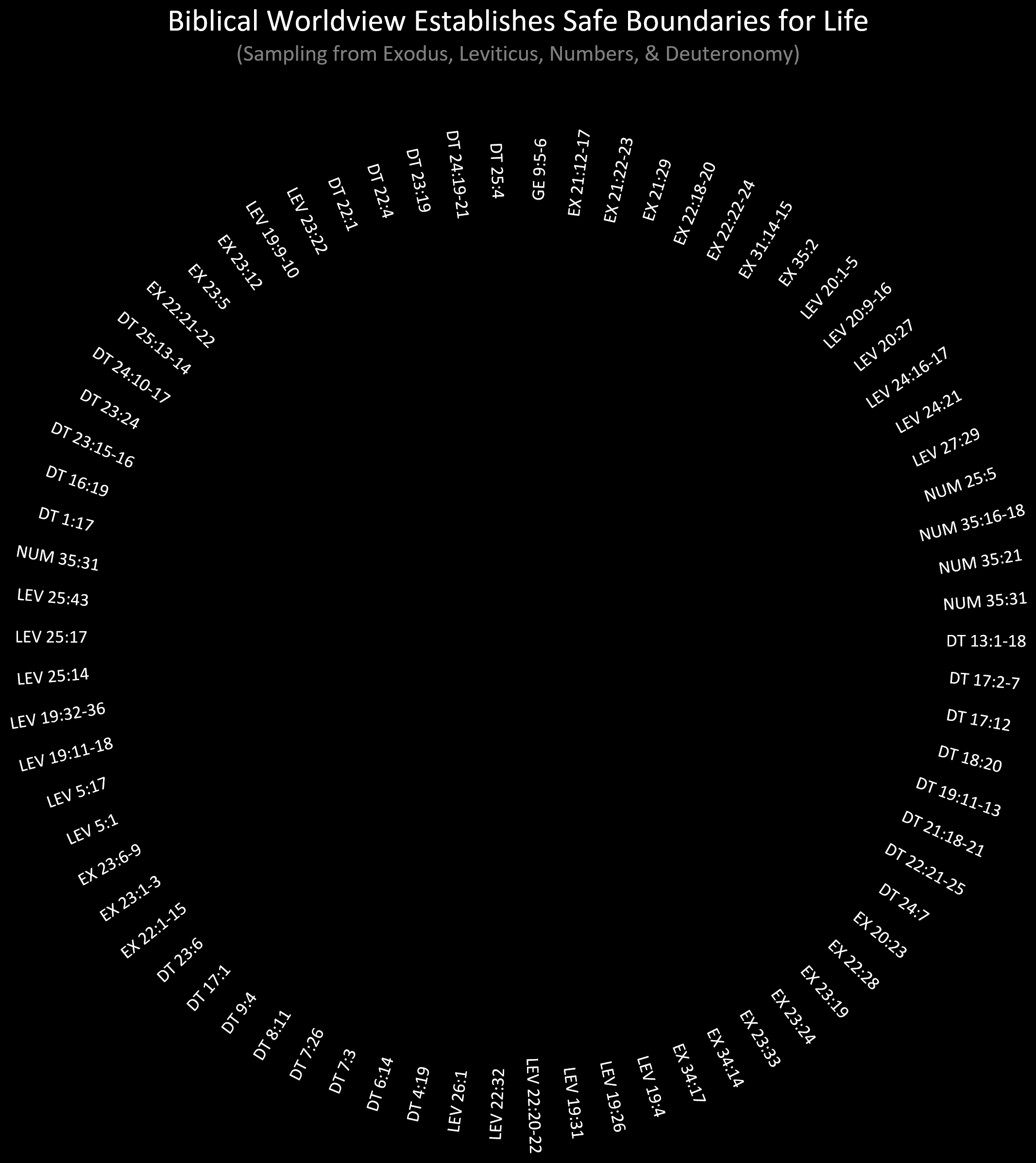
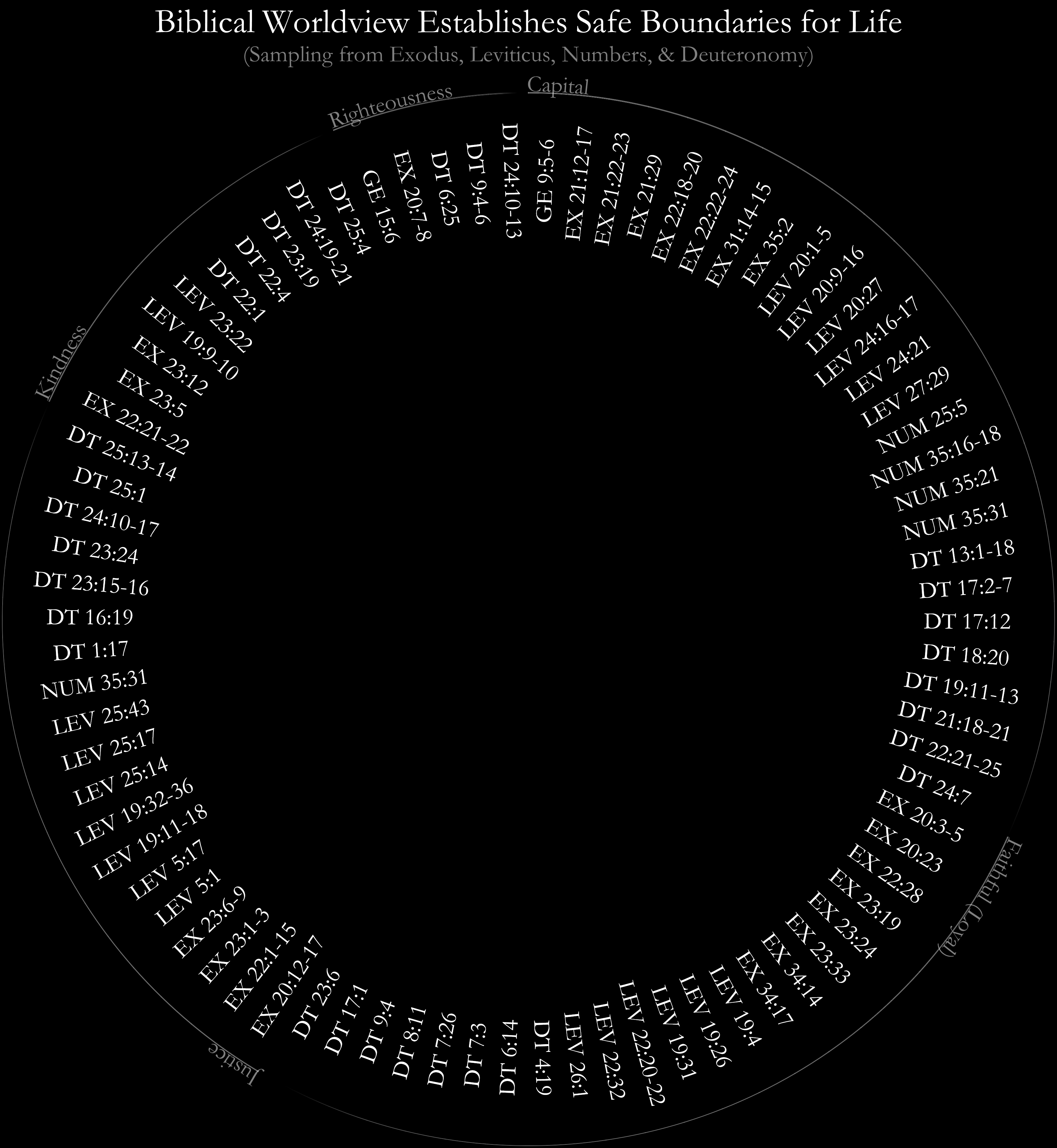
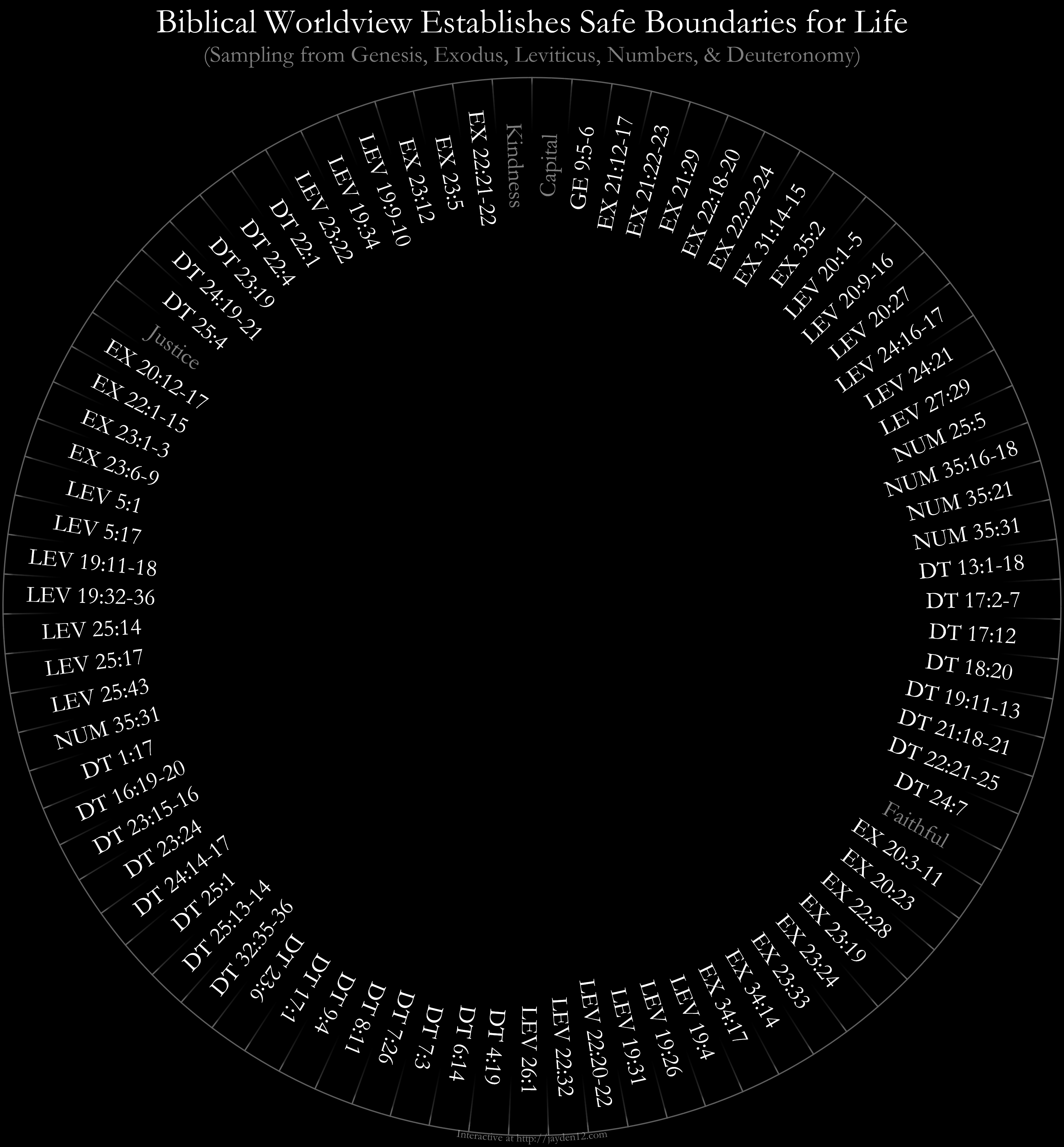
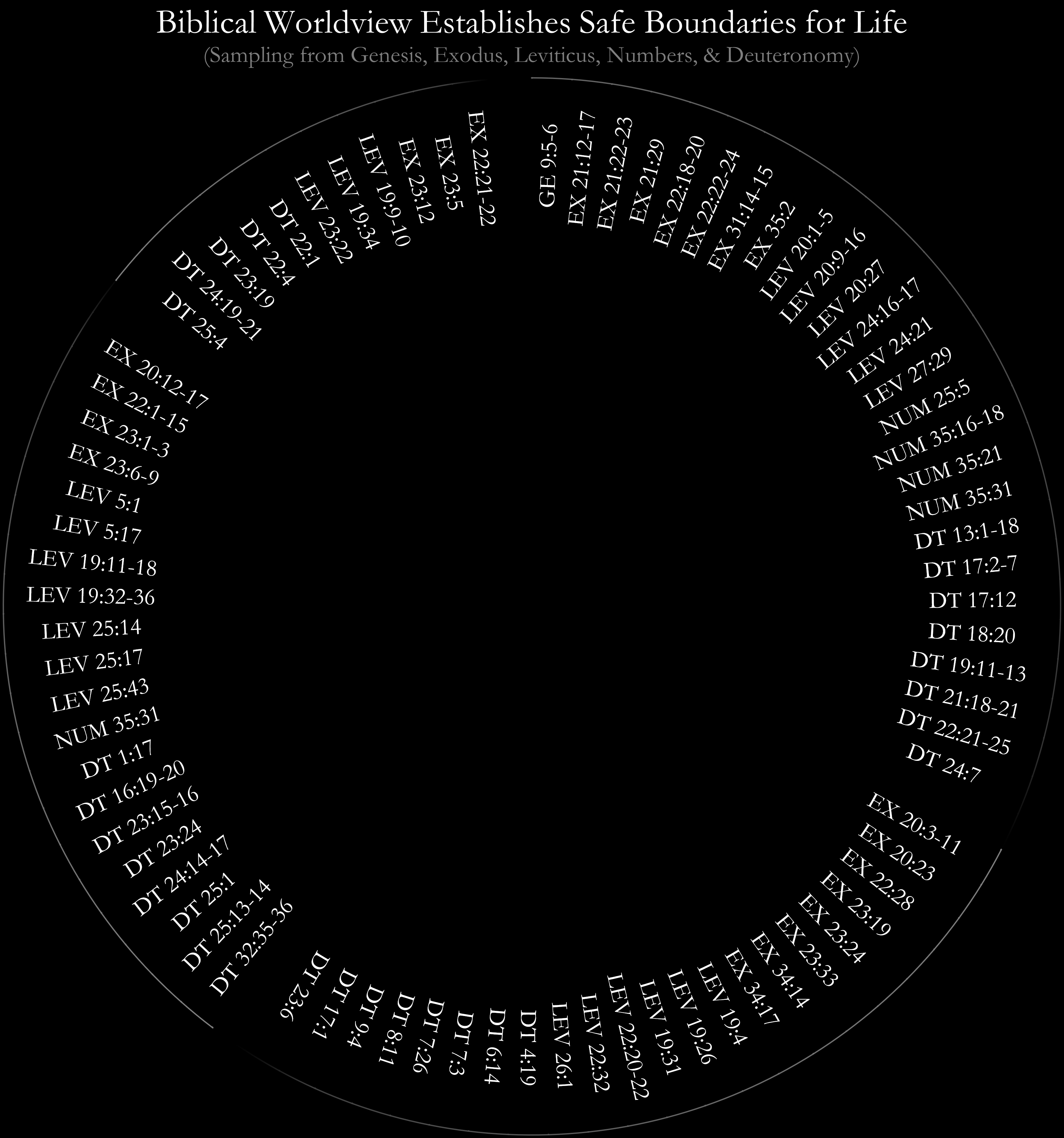
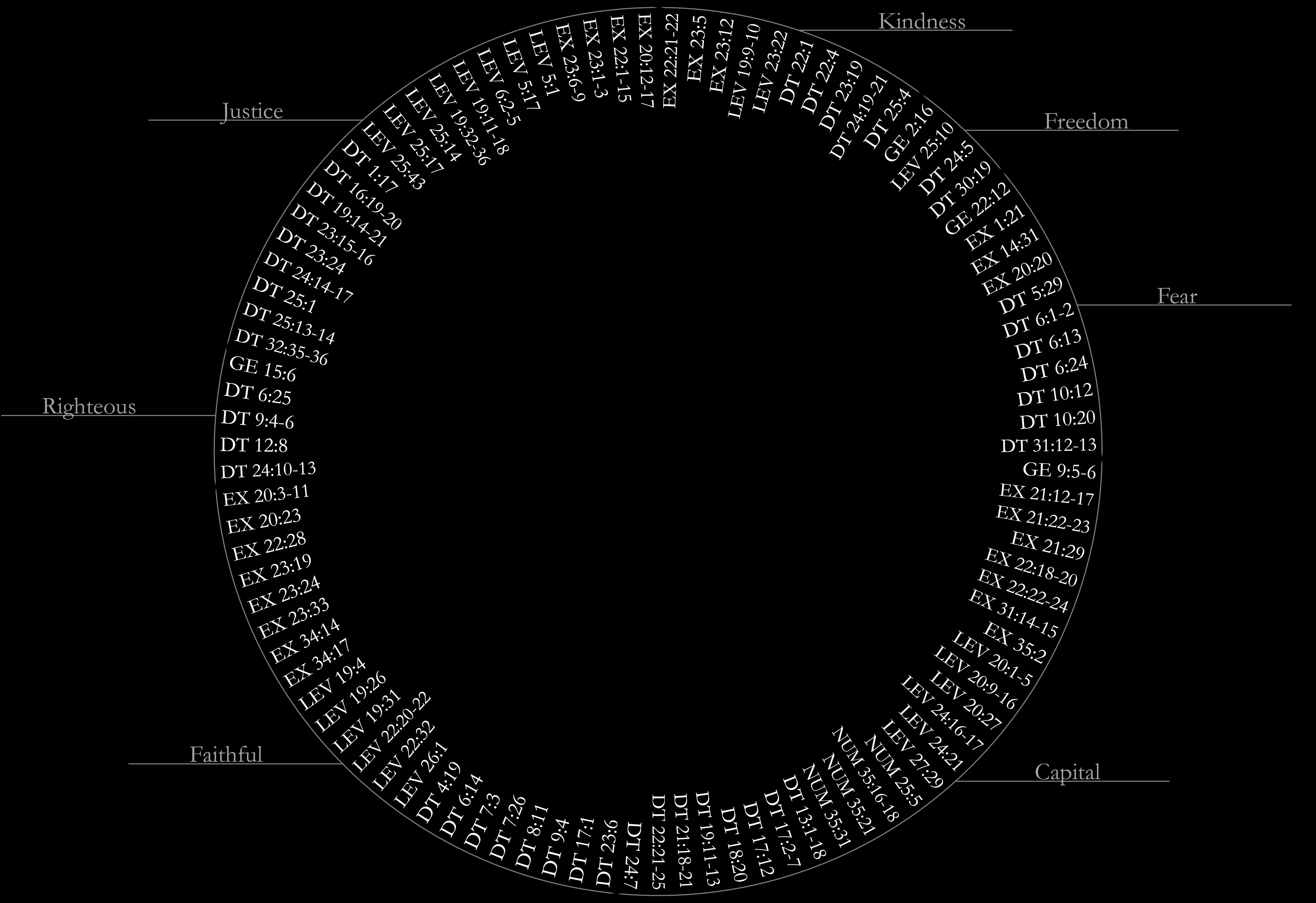
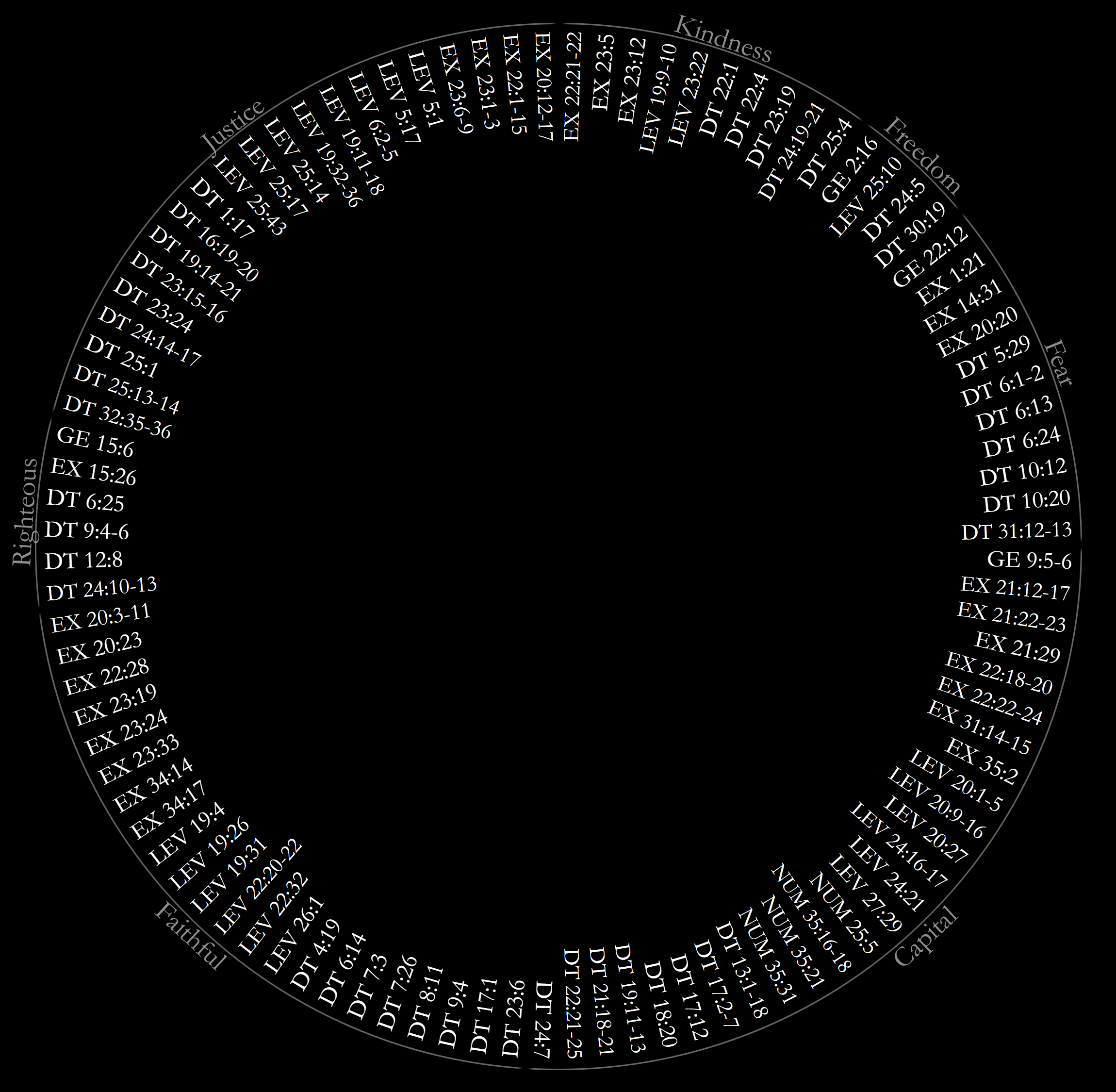
First 4 versions were made with Microsoft Excel, last 2 with Ploty here.
Printer friendly (latest version)



